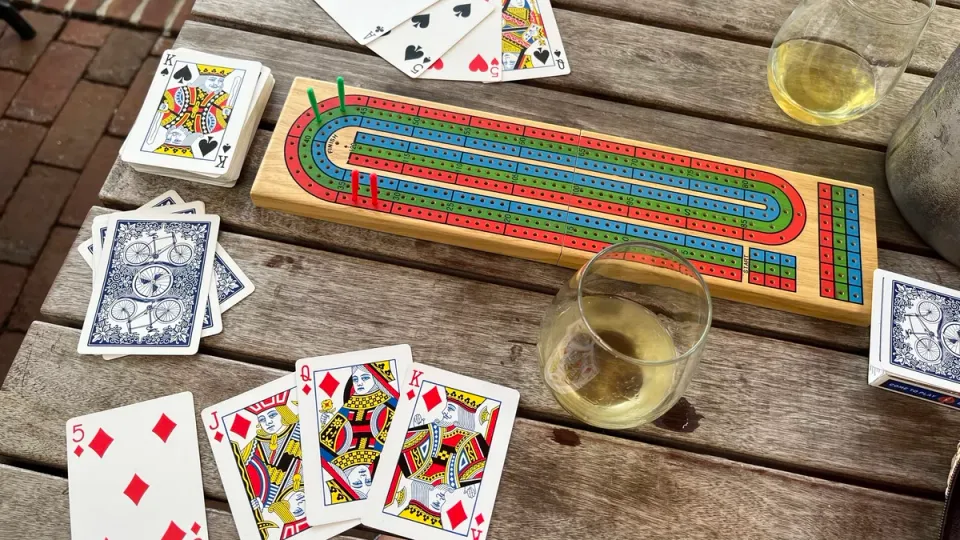Cribbage: Fifteen Two, Fifteen Four, and the Joy of the Peg

Let’s pull back and talk about my other favorite board game, other than Go and Chess!
Some of my clearest childhood memories aren't of grand vacations or milestone birthdays, but of the simple, rhythmic sound of wooden pegs moving across a board. Gathered around the kitchen table, cards in hand, the air thick with mutters of people trying to remember what 7+6 is, my family played Cribbage. It was, and still is, a constant thread connecting the Volker generations. While my strategic inclinations later drew me to the deep complexities of Go and the tactical battles of Chess, Cribbage holds a unique, enduring place – a fascinating blend of calculation, chance, and complete trash-talking!
But what exactly is this game with the funny board and the odd counting? Let's break it down.
Understanding Cribbage: The Basics
At its heart, Cribbage is a card game typically played by two people (athough variations exist for three or four), using a standard 52-card deck. The goal is simple: be the first player to score 121 or more points, tracked by moving pegs along a distinctive wooden board (ours was usually in the shape of the number “29”, which I later found out was the maximum points you could get in a hand). The game flows through several distinct phases in each hand:
- The Deal: Cards are dealt one at a time until each player has six (in a two person game. With games with more players, the way the cards are dealt will change).
- The Discard (The Crib): This is where the first layer of strategy comes in. Each player chooses two cards from their hand to discard face-down into a separate pile called the "crib." This four-card crib belongs to the dealer for that hand and is scored later. Deciding what to keep for your hand versus what to potentially give the dealer's crib is a crucial early calculation. Do you keep a promising hand for yourself, or try to ruin the opponent’s crib with cards unlikely to score well (or cards that might do well if you are the dealer for that round)?
- The Cut (The Starter Card): The non-dealer cuts the remaining deck, and the dealer turns over the top card. This is the "starter" or "cut" card. It's considered part of both players' hands (and the crib) when scoring after the play phase. If this cut card is a Jack, the dealer immediately scores two points for (our family always exclaimed “Two for the Jack!”).
- The Play (Pegging): This is the most interactive phase. Starting with the non-dealer, players take turns laying one card face-up, announcing the cumulative total of the cards played. The goal is to add cards without exceeding a total of 31. Points are scored during this phase for specific combinations:
- Fifteen: Making the count exactly 15 scores 2 points.
- Pairs: Playing a card of the same rank as the previous card scores 2 points (a "pair royal" – three of a kind – scores 6; a "double pair royal" – four of a kind – scores 12).
- Runs: Playing a card that forms a sequence of three or more with the previous cards (regardless of suit or order played) scores points equal to the length of the run (e.g., playing a 5 after a 3 and 4 scores 3 points).
- Thirty-One: Reaching exactly 31 scores 2 points.
- Go / Last Card: If a player cannot play a card without exceeding 31, they say "Go." The other player continues playing cards if possible. If they also cannot play, the last player to lay a card scores 1 point. If they manage to hit 31 exactly, they score 2 points instead of 1. The count then resets to zero, and the player who called "Go" starts the next sequence. The very last card played in the pegging phase (when all cards are gone) also scores 1 point.
- The Show (Scoring the Hands): After pegging, players score the points in their hands, using their original four cards plus the starter card. Points are awarded for:
- Fifteen: Any combination of cards totaling 15 scores 2 points.
- Pairs: Any pair of cards scores 2 points.
- Runs: Any sequence of three or more cards scores points equal to its length.
- Flush: Four cards of the same suit in hand score 4 points. If the starter card is also the same suit, it's a 5-point flush. (Note: A flush cannot be scored using only three hand cards and the starter).
- His Nobs: Having the Jack of the same suit as the starter card in your hand scores 1 point.
- After the non-dealer scores their hand, the dealer scores theirs, and then scores their crib (the four discarded cards plus the starter card) using the same rules.
The deal alternates, and play continues until someone pegs past the 120 mark to reach 121 or more.
Why We Love It: Math, Luck, and Lively Banter
So, why has this game captivated players for centuries, myself included?
- The Perfect Blend: Cribbage masterfully mixes skill and luck. You can't control the cards you're dealt or the cut card (luck), but how you choose your discards, play your cards during pegging, and recognize scoring combinations requires real strategy and calculation (skill). This blend keeps it exciting – sometimes a lucky cut saves you, other times clever play turns a mediocre hand into points. This balance reminds me of Go and Chess, where despite having perfect information, unforeseen tactics (your opponent's 'luck' or brilliance) can drastically change the game. Cribbage just makes the luck element more explicit.
- Constant Calculation: Forget calculators; Cribbage is a mental math workout! From quickly spotting 15s in your hand (7+8, 6+9, 5+5+5, face cards+5) to tracking the count during pegging and anticipating your opponent's plays, your brain is always working. It’s this constant numerical dance that resonates with the pattern recognition and positional calculation needed in Go and Chess, just applied differently.
- The Social Spark (and Trash Talk 😈): Unlike the often silent, intense focus of a serious Go or Chess match, Cribbage invites interaction. The back-and-forth of pegging, the groans when an opponent gets a lucky cut, the cheers for a high-scoring hand – it's inherently social. And let's be honest, the opportunity for good-natured teasing is part of the charm. Missing points your opponent should have claimed ("Muggins," in some circles, allowing you to steal them) adds another layer of playful competition (my family hates this rule, but I think it would’ve been fun!). It encourages banter in a way few other strategy games do.
Cribbage, Go, and Chess: Strategic Cousins?
While vastly different on the surface, these games scratch a similar itch for me. They all demand:
- Strategic Foresight: Deciding which cards to discard impacts both your hand and your opponent's potential crib score. Playing offensively versus defensively during pegging requires anticipating responses. This mirrors planning several moves ahead in Chess or considering large-scale territory influence in Go.
- Pattern Recognition: Quickly seeing potential runs, pairs, and 15s in a hand is like spotting tactics in Chess (forks, pins) or recognizing life-and-death shapes in Go.
- Calculated Risk: Do you hold onto a potential run, hoping for the right cut card, or guarantee points with a certain pair? Do you play aggressively during pegging, hoping to score, or hold back key cards for the Show? Every decision involves weighing probabilities and potential outcomes, much like sacrificing a pawn for position in Chess or invading opponent territory in Go.
Cribbage may have a healthy dose of luck that Go and Chess lack, but the underlying mental engagement – the calculation, the planning, the outwitting – feels surprisingly familiar. It’s a lighter, faster-paced cousin, perhaps, but a member of the same strategic family.
It's a game that has created countless memories around my family table, a tradition passed down, always ready for another round. The combination of simple rules, hidden depth, math, luck, and social interaction makes it truly timeless.
What about you? Are you a Cribbage player? What's the highest-scoring hand you've ever had, or your most memorable pegging duel (hehe)? Do you see connections between Cribbage and other strategy games you enjoy? Share your stories and thoughts in the comments below – I'd love to hear them!


Comments ()